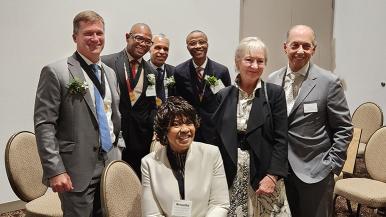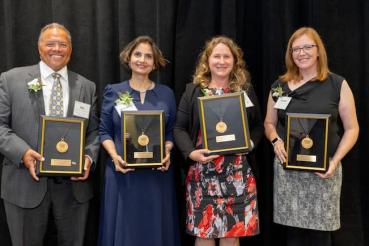In 1963 Rush established the first endowed professorship at a private hospital in the United States. Today there are more than 100 endowed faculty positions at Rush University, including five positions recently appointed to new holders.
Endowed faculty positions are the highest honor bestowed by the University and recognize some of the most exceptional physicians, nurses, allied health professionals, community engagement leaders and scientific investigators who have dedicated their careers to the future of science, medicine, health equity and patient care.
“Endowments are special,” said Larry J. Goodman, MD, interim president of Rush University. “Endowments say we not only have incredible confidence in you today; we have confidence in you forever.”
By providing the gift of protected time, endowed positions enable our leading faculty to focus their efforts on advancing transformative research and education initiatives, while supporting our mission to provide equitable health care for all. The positions are often made possible by the generosity of philanthropic partners. Their gifts demonstrate not only a confidence and commitment to outstanding individuals but also an investment in Rush’s future.
“Endowed gifts are a testament to the intellectual capacity and generosity of the community that supports Rush in so many different ways,” said Christine M. Kennedy, PhD, RN, FAAN, the John L. and Helen Kellogg Dean of the Rush University College of Nursing and interim provost and vice president of Rush University.
At an investiture ceremony held in September, Rush appointed the following faculty members to endowed positions:
- James Joseph Conners, MD, MS, FAHA, to the Jean Schweppe Armour Professorship of Neurology
- Theodore J. Corbin, MD, MPP, to the Carole A. and Leo M. Henikoff, MD, Presidential Professorship
- Wrenetha Julion, PhD, MPH, RN, FAAN, CNL, to the Michelle and Larry Goodman, MD, Professorship of Health Equity
- Philip Omotosho, MD, to the Jack Fraser Smith Professorship in Surgery
- John A. Rich, MD, MPH, to the Harrison I. Steans Directorship for the RUSH BMO Institute for Health Equity
Cynthia Brincat, MD, PhD, acting dean of Rush Medical College, noted these endowments demonstrate a collaborative approach to achieving Rush’s mission.
“When you hold an endowed chair, it’s really a relationship,” Brincat said. “It ties you to the person who’s donated, to the person we’re honoring, and it ties you to Rush. It connects you to the history and future of Rush, while demonstrating a commitment from Rush to fulfill your vision.”
Endowed chairholders drive the future of Rush
Conners, who serves as chairperson for the Department of Neurological Sciences, received Rush’s oldest endowed chair. In 1963, Trustee A. Watson Armour III established the Jean Schweppe Armour Professorship of Neurology in honor of his wife, Jean, launching Rush’s longstanding tradition of endowed positions.
Conners plans to use the funds to advance Rush’s education and research missions, with a focus on fostering the research interests of junior faculty members — related to stroke and epilepsy to start. He also seeks to recruit a new senior scientist for translational neurosciences and to fund fellowships.
“The pressures of health care have probably never been as intense as they are now,” Conners said. “Because funding for research and education has become increasingly difficult to obtain, it’s really philanthropy that will allow us to continue our academic mission.”
Corbin, chairperson of the Department of Emergency Medicine, intends to focus on recruiting, retaining and promoting committed, talented faculty members. The Henikoff family, including former Rush University president Leo M. Henikoff, MD, established the presidential professorship in 2020 with that very mission in mind. In addition to being appointed to the professorship, Corbin was recently elected to the National Academy of Medicine, one of the highest honors in the field of medicine.
Julion, associate dean for equity and inclusion at Rush University College of Nursing, has focused much of her research on supporting families of color in economically marginalized communities. As the first person to hold the Michelle and Larry Goodman, MD, Professorship of Health Equity, she will develop and direct strategies to build and sustain a culture of inclusion and promote a diverse community of students, staff and faculty at the college, while addressing Black maternal and infant mortality and morbidity disparities.
Omotosho, a gastrointestinal surgeon with expertise in bariatric surgery, was appointed to the Jack Fraser Smith Professorship in Surgery made possible in 1974 by the generosity of the Smith family, who intended that the endowment boost innovation in surgery.
“The foresight and generosity that goes into setting up a professorship and an endowment is mission-enabling,” Omotosho said. “By providing resources for the Department of Surgery, we are able to advance Rush’s mission to provide clinical care, educate the next generation of leading surgeons, conduct high-quality research and ground all this work in a deep commitment to the community.”
A nationally recognized health equity expert and member of the National Academy of Medicine, Rich is the inaugural director of the RUSH BMO Institute for Health Equity. His endowed directorship honors the legacy of Harrison I. Steans and Harrison’s commitment to promoting stronger education, employment, health and safety for residents of Chicago’s West Side.
“So much of what Rush and the Institute are doing epitomizes what my dad was all about,” said Harrison’s daughter Jennifer Steans, a Rush University Medical Center trustee since 2014 and chair of its Health Equity Advisory Council. “Rush is fortunate to have Dr. Rich as the first director of the Institute, and we’re excited about his vision to ensure that everybody has access to high-quality health care, no matter where you live.”
Through the funding he has received, Rich seeks to support authentic community partnerships to address the drivers of health inequities.
“These resources will be difference-makers as they support key facets of the work of the RUSH BMO Institute for Health Equity, which includes building the next generation of faculty, students, community-engaged researchers and practitioners to address the complex issues we face,” Rich said.




